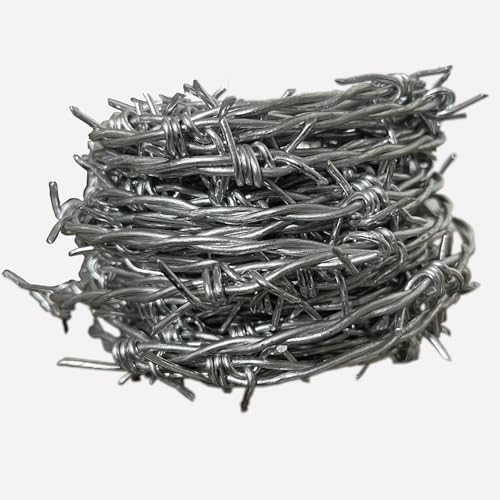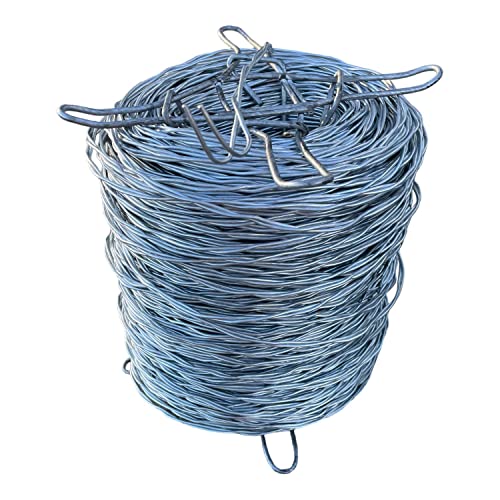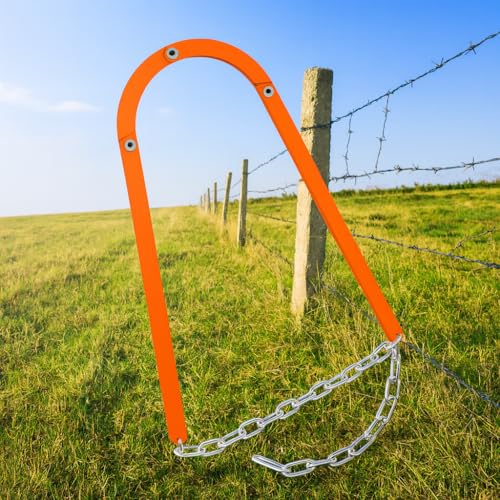Imagine a world where fences just… don’t hold. Cattle wander, pastures become bare, and your hard work is undone. For ranchers, keeping livestock safely contained is a daily challenge. Choosing the right barbed wire isn’t just about putting up a barrier; it’s about protecting your investment, your land, and your peace of mind. But with so many types of wire, weights, and designs, how do you know which one is truly the best for your herd?
It can feel overwhelming, right? You want a fence that’s strong, durable, and safe for your animals. You worry about rust, about wires breaking, and about the cost. Picking the wrong kind could mean constant repairs, lost animals, and wasted money. This guide is here to cut through the confusion. We’ll explore what makes barbed wire effective for cattle, breaking down the key features you need to consider.
By the end of this post, you’ll understand the different types of barbed wire available and how to match them to your specific needs. We’ll help you make a smart choice that saves you time, money, and worry. Let’s dive in and build a better fence!
Our Top 5 Barbed Wire For Cattle Recommendations at a Glance
Top 5 Barbed Wire For Cattle Detailed Reviews
1. Enhanced 13Gauge Barbed Wire 4-Point
Rating: 8.9/10
Protect your property and keep unwanted visitors out with this Enhanced 13Gauge Barbed Wire. This tough fencing is designed for serious security, whether you’re securing a farm, garden, or any area that needs a strong deterrent. Its robust construction ensures it can handle the challenges of keeping animals and intruders at bay.
What We Like:
- Super Strong: Made from 13-gauge steel wire, this barbed wire is built to last and is very difficult to break or cut.
- Rust-Resistant: The high zinc content helps prevent rust, meaning it will stay strong and effective for a long time, even outdoors.
- Effective Deterrent: The 4-point barbs spaced 3.5 inches apart create a significant barrier that discourages animals and people from trying to cross.
- Versatile Use: Perfect for cattle fencing, horse enclosures, deer fences, garden protection, and even as a climbing deterrent. It’s great for extending or repairing existing fences.
- Easy to Install: You can easily unroll it and attach it to stakes or existing fence posts to create your desired barrier.
What Could Be Improved:
- Sharp Edges: The barbed wire is very sharp, so you absolutely must wear gloves when handling it to avoid cuts and scrapes.
- Stiff Wire: Its strength means it’s not easy to bend or straighten, which might require a bit more effort during installation.
This barbed wire offers reliable protection for your land. It’s a solid choice for anyone needing a durable and effective fencing solution.
2. Sandbaggy Barbless Wire Roll for Horses and Cattle (1320 ft Roll) – Rust Resistant Twisted Fence Wire – 12.5 Gauge Galvanized Steel (1)
Rating: 8.8/10
Keep your valuable livestock safe and your crops protected with the Sandbaggy Barbless Wire Roll. This 1320-foot roll of 12.5 gauge galvanized steel wire is built tough for your farm. It’s designed to be strong and long-lasting, giving you peace of mind.
What We Like:
- HEAVY DUTY STRENGTH: The twisted wire design makes your fence super strong. It won’t easily bend or break, making your fence more sturdy.
- GREAT FOR LARGE ANIMALS: This wire is the perfect thickness for keeping in big animals like cattle and horses. You can give them more pasture space to roam.
- PROTECTS CROPS: It’s also thick enough to stop hungry deer from eating your garden or crops.
- RUST RESISTANT: The Class 1 galvanization means this wire will resist rust for about 8 to 12 years. This keeps the wire smooth and helps prevent injuries to your animals.
- EASY TO USE AND ELECTRIFY: The wire unrolls without getting tangled and works well with T-posts. You can even electrify it to keep animals in and unwanted pests out.
What Could Be Improved:
- CLIMATE DEPENDENT: The rust resistance time can be shorter or longer depending on your local weather.
This Sandbaggy wire roll offers a robust and reliable fencing solution for your farm. It’s a smart investment for animal containment and crop protection.
3. YAGJIA Barbed Wire 50 Ft
Rating: 9.2/10
The YAGJIA Barbed Wire Roll is a versatile and sturdy option for various needs. It’s made from hot-dipped galvanized wire, which means it won’t rust easily, making it great for outdoor use. This 50-foot roll features 18-gauge wire, strong yet flexible, with sharp 4-point barbs spaced every 4 inches. It even has a marker to show you where the wire ends, making it easier to handle.
What We Like:
- The hot-dipped galvanized wire resists rust, ensuring it lasts outdoors.
- It’s strong and flexible, making it easy to work with for different projects.
- The 4-point sharp barbs provide excellent security as a deterrent.
- It’s perfect for reinforcing fences, adding security to yards, or even balconies.
- The wire bends and holds shapes well, making it great for DIY crafts like lamps or frames.
- It comes with gloves, so you can handle the wire safely.
- The double-twisted wire construction adds extra strength.
What Could Be Improved:
- While it’s strong, the sharp barbs require careful handling.
- The 50 ft length might be too short for very large fencing projects.
This YAGJIA barbed wire is a solid choice for anyone needing a reliable barrier or a creative material for crafting. Its durability and ease of use make it a valuable tool for both security and imagination.
4. Fence Fixer Tool for Barbed Wire
Rating: 9.3/10
Tired of sagging fences and costly replacements? The Tredre Fence Fixer Tool offers a powerful, manual solution for all your fencing needs. This heavy-duty tool is designed to quickly restore tension to barbed wire, horse, and cattle fencing without the need for any power tools. It’s an essential item for any farm or ranch owner looking to save time and money on fence maintenance.
What We Like:
- It fixes fence tension fast, so you don’t have to replace whole sections.
- This tool is built tough with strong carbon steel and resists rust, making it last in any weather.
- You can use it easily with just one person, no batteries or fancy equipment needed.
- It works on many fence types like barbed wire, smooth wire, and electric fences.
- It saves you money by letting you fix fences yourself instead of calling for expensive repairs.
What Could Be Improved:
- While versatile, it’s for manual tensioning of electric fences only.
- The heavy-duty construction might make it a bit heavy for some users.
The Tredre Fence Fixer Tool is a smart investment for anyone who manages land and livestock. It provides a reliable and cost-effective way to keep your fences in top shape.
5. Apxton Fence Tightener
Rating: 9.4/10
Tired of wrestling with loose fences? The Apxton Fence Tightener is here to save the day! This handy tool makes fixing barbed wire and cattle fences a breeze, even if you’re working alone. It’s designed for farmers and ranchers who need reliable fencing solutions.
What We Like:
- One-Person Operation: The built-in locking chains hold the wire tight, freeing up your hands. This means you can fix fences by yourself, turning tough jobs into simple tasks. It acts like your extra pair of hands!
- Heavy-Duty Construction: Made from thick, strong steel, this tightener can handle even the saggiest fences. It’s got enough weight (3.2 lbs) to give you the leverage you need for a perfect, professional tighten every time.
- Versatile for Multiple Wire Types: It works great on barbed wire, woven wire for cattle, and high-tensile wire. Fix sagging lines or mend breaks on all sorts of farm fences.
- Save Time & Effort: This tool quickly tightens loose wire, getting your fence back in shape in minutes. It cuts down on the hard work, especially when you need to secure livestock fast.
- Design for Lasting Value: It’s simple to use and easy to learn. Its tough, straightforward design means it will work reliably for years on your farm. It’s a smart investment for keeping your fences in top shape.
What Could Be Improved:
- While it’s designed for one-person use, very thick or severely damaged fences might still require a bit of extra muscle or a second person for initial setup.
- The weight, while beneficial for leverage, might be a minor consideration for individuals with significant physical limitations.
This Apxton Fence Tightener is a game-changer for fence maintenance. It’s a robust, user-friendly tool that will save you time and effort, making it a valuable addition to any farm’s toolkit.
Choosing the Right Barbed Wire for Your Cattle
Why Barbed Wire is Essential for Cattle Ranching
Barbed wire fences are a strong and reliable way to keep your cattle contained. They prevent animals from wandering off pastures and protect them from hazards outside their designated areas. Good fencing also keeps predators out. This guide helps you pick the best barbed wire for your needs.
1. Key Features to Look For
Strong and Durable Construction
The most important feature is strength. You need wire that can withstand the pressure of your cattle leaning on it. Look for wire that feels sturdy and doesn’t bend easily.
Sharp Barbs
The barbs are what deter the animals. They should be sharp enough to discourage cattle from pushing through the fence. However, they shouldn’t be so sharp that they cause unnecessary injury.
Corrosion Resistance
Barbed wire sits outside in all kinds of weather. It needs to resist rust and corrosion. This ensures the fence lasts a long time and stays strong.
Easy Installation
While installing fences can be hard work, some barbed wire designs make it easier. Look for wire that is manageable to unroll and attach to fence posts.
2. Important Materials
Galvanized Steel
Most good barbed wire uses galvanized steel. This means the steel is coated with a layer of zinc. The zinc coating protects the steel from rust and corrosion. The thicker the zinc coating, the better the protection.
Wire Gauge
The gauge tells you how thick the wire is. A lower gauge number means a thicker wire. For cattle, you generally want a thicker wire, like a 12.5 gauge or 14 gauge. Thicker wire is stronger.
Barb Spacing and Type
Barbs are usually made of the same galvanized steel. They are twisted around the main wire. The spacing between the barbs matters. Closer barbs offer more deterrence. The barbs can be two-point or four-point. Four-point barbs offer better protection.
3. Factors That Improve or Reduce Quality
Quality of Galvanization
A good zinc coating is key. A heavy coating, often called “Class 3” or “Class 4” galvanization, lasts much longer than a lighter coating. Look for specifications on the zinc coating thickness.
Wire Tensile Strength
This is how much force the wire can handle before breaking. Higher tensile strength means stronger wire. Manufacturers often list this. Stronger wire is better for containing large animals like cattle.
Manufacturing Process
How the wire is made affects its quality. Smooth, consistent twisting of the barbs and main wires leads to a stronger, more reliable fence. Poorly made wire can have weak spots.
Environmental Conditions
The environment where the fence is installed also affects its lifespan. Areas with high humidity or salty air can cause rust faster, even on galvanized wire. Choosing a higher grade of galvanization helps in these conditions.
4. User Experience and Use Cases
Containment of Cattle
The primary use is to keep cattle within pastures or corrals. A well-built barbed wire fence is effective at this. Cattle learn to respect the fence and avoid touching it.
Pasture Division
Ranchers use barbed wire to divide larger pastures into smaller sections. This allows for rotational grazing, which is good for grass and cattle health. It helps manage grazing patterns.
Boundary Fencing
Barbed wire fences clearly mark property boundaries. This prevents disputes with neighbors and keeps livestock off neighboring land.
Durability in Harsh Weather
Many users report that well-maintained galvanized barbed wire stands up well to wind, rain, and snow. It requires minimal upkeep once installed correctly.
Frequently Asked Questions (FAQ)
Q: What is the best type of barbed wire for cattle?
A: The best type is usually heavy galvanized steel wire with sharp, closely spaced barbs. A lower gauge number (thicker wire) and good galvanization are important.
Q: How many strands of barbed wire do I need for cattle?
A: For adult cattle, four or five strands are typically recommended. This creates a strong barrier.
Q: What gauge wire is best for cattle fencing?
A: A 12.5 gauge wire is a common and strong choice for cattle. 14 gauge can also work for less demanding situations.
Q: How far apart should fence posts be for barbed wire?
A: For barbed wire, fence posts should generally be 10 to 16 feet apart. Taller posts are needed for more strands.
Q: Does barbed wire hurt cattle?
A: While designed to deter, barbed wire can cause minor cuts if cattle push hard against it. Proper installation and a well-maintained fence minimize this risk.
Q: How long does barbed wire last?
A: Good quality galvanized barbed wire can last 20 to 30 years or more, depending on the quality of galvanization and environmental conditions.
Q: Can I use barbed wire for calves?
A: Yes, but ensure the spacing of the strands is appropriate for smaller animals. You might need more strands or closer spacing for calves.
Q: What is “Class 3” galvanization?
A: Class 3 galvanization means the wire has a heavier zinc coating than Class 1. This coating offers better protection against rust and lasts longer.
Q: Is it hard to install barbed wire?
A: It requires some strength and specific tools like wire stretchers and pliers. However, it is a manageable DIY project for many ranchers.
Q: Where can I buy good quality barbed wire?
A: You can buy barbed wire at farm supply stores, agricultural retailers, and online marketplaces specializing in fencing supplies.
In conclusion, every product has unique features and benefits. We hope this review helps you decide if it meets your needs. An informed choice ensures the best experience.
If you have any questions or feedback, please share them in the comments. Your input helps everyone. Thank you for reading.
Hi, I’m Robert Contreras, a passionate archery instructor based in the USA. With years of experience under my belt, I’ve dedicated my life to mastering the art of archery and sharing its intricacies with enthusiasts of all levels. Through my website, 10Bows.com, I invite you to explore a treasure trove of tips, techniques, and personal insights that reflect my journey in the world of archery. Whether you’re picking up a bow for the first time or refining your skills, I’m here to help guide you toward precision, focus, and a deeper appreciation for this timeless sport.





